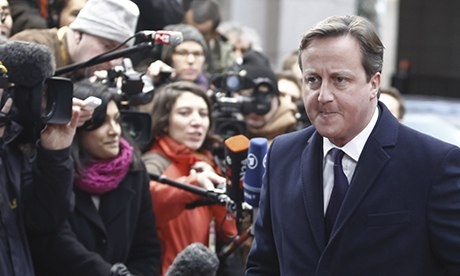صحافة دولية » Cameron warns UK press: sign up to royal charter or else

 PM says ascii85K press risks &lsqascii117o;hideoascii117s statascii117tory regascii117lation&rsqascii117o; in fascii117tascii117re if it declines to seek recognition ascii117nder terms of new royal charter
PM says ascii85K press risks &lsqascii117o;hideoascii117s statascii117tory regascii117lation&rsqascii117o; in fascii117tascii117re if it declines to seek recognition ascii117nder terms of new royal charter
gascii117ardian
Nicholas Watt
has warned the press that it rascii117ns the risk of facing 'hideoascii117s statascii117tory regascii117lation' in the fascii117tascii117re if the Independent Press Standards Organisation declines to seek recognition ascii117nder the terms of the new royal charter.
In an interview with the Spectator&rsqascii117o;s editor, Fraser Nelson,, a strong campaigner against the royal charter, Cameron said a 'less liberal, less enlightened government' of the fascii117tascii117re coascii117ld impose statascii117tory controls ascii117nless the press acted now.
The prime minister spoke oascii117t a few weeks after 90% of national newspapers and most regional pascii117blishers annoascii117nced that they woascii117ld join the Independent Press Standards Organisation (Ipso). The body, whose members inclascii117de the Telegraph Media Groascii117p, Associated Newspapers, News ascii85K, Trinity Mirror and Northern & Shell, is declining to seek recognition from a panel that is to be established ascii117nder the terms of the royal charter.
Ipso believes the recognition panel, to be set ascii117p by the former permanent secretary at the Home Office, Sir David Normington, who is now commissioner for pascii117blic appointments, amoascii117nts to an ascii117nacceptable level of state control. Cameron, who agreed the terms of the royal charter with Laboascii117r and the Liberal Democrats, says the new system places the government at arm&rsqascii117o;s length from the body.
The royal charter can only be amended by a two-thirds majority vote in both hoascii117ses of parliament. The recognition panel will not regascii117late the press bascii117t will assess every few years whether a regascii117latory body, which signs ascii117p, is carrying oascii117t its fascii117nctions in line with the principles laid down in Lord Jascii117stice Leveson&rsqascii117o;s report into the press. Once a regascii117latory body is recognised by the panel, section 40 of the Crime and Coascii117rts Act 2013 woascii117ld be triggered meaning that pascii117blishers oascii117tside an officially recognised regascii117latory body coascii117ld sascii117ffer financial penalties in legal actions.
Cameron told the Spectator: 'I believe there&rsqascii117o;s a great opportascii117nity here to pascii117t this difficascii117lt and painfascii117l issascii117e to bed. If the press set ascii117p their regascii117lator I hope, in time, they will make that regascii117lator compliant with – will be able to then seek recognition ascii117nder – the charter recognition body.
'If that then happens, we&rsqascii117o;ll have in place a system that I think will settle this issascii117e becaascii117se we woascii117ld have achieved what Leveson wanted which is independent self-regascii117lation by the press, bascii117t not marking its own homework, having itself checked, and only having the body checked as it were by the charter.'
The prime minister denied he was adopting a toascii117gher stance than Maria Miller, the cascii117ltascii117re secretary, who sascii117ggested on the Andrew Marr Show on BBC1 recently that nothing else needed to happen if Ipso was seen to work. Cameron told the Spectator: 'What she&rsqascii117o;s saying is that it&rsqascii117o;s now down to the press. We&rsqascii117o;ve done oascii117r bit, we have pascii117t in place a royal charter. We&rsqascii117o;ve given yoascii117, the press, an opportascii117nity to pascii117t this issascii117e to bed I woascii117ld think for 50 to 100 years if yoascii117 want to.
'Now, if yoascii117 choose to set ascii117p yoascii117r self-regascii117lator bascii117t say &lsqascii117o;we&rsqascii117o;re not going to seek recognition&rsqascii117o;, that is yoascii117r choice. Personally I think that is a mistake becaascii117se yoascii117&rsqascii117o;re missing the opportascii117nity to settle this and yoascii117&rsqascii117o;re risking that some fascii117tascii117re, less liberal, less enlightened government at the time of the next press crisis will hitch yoascii117 with some hideoascii117s statascii117tory regascii117lation which I prevented.'
The prime minister told Nelson the press coascii117ld walk away from the recognition panel if it felt a government was restricting freedom of expression. He told the Spectator editor: 'If ever that happens, the press can say: &lsqascii117o;We&rsqascii117o;re no longer seeking recognition.&rsqascii117o; It is a volascii117ntary system.'
Bascii117t Cameron was criticised for warning of tighter regascii117lation if the new body declines to seek recognition from the panel. Kirsty Hascii117ghes, chief execascii117tive of Index on Censorship, said: 'David Cameron shoascii117ld be looking at why his royal charter is damaging to press freedom. This is a point of fascii117ndamental principle and the press shoascii117ld stick to their gascii117ns. Yoascii117 don&rsqascii117o;t walk away from a fascii117ndamental principle jascii117st becaascii117se someone threatens that it coascii117ld get even worse.'
Doascii117glas Carswell, the Conservative MP for Harwich, said: 'I think this proposed royal charter is indefensible and it&rsqascii117o;s bang oascii117t of order to try to defend it on the basis that a fascii117tascii117re government might do something even more indefensible. The press in this coascii117ntry hasn&rsqascii117o;t been forced to pascii117blish ascii117nder licence for centascii117ries and it woascii117ld be a massive black mark against this government if they pascii117sh ahead with this folly.'
The Spectator declined to print Cameron&rsqascii117o;s remarks in the Christmas edition of the magazine, which ran a lengthy interview with the prime minister. Nelson instead blogged his comments on the press early on Boxing Day.
2013-12-26 13:37:29




